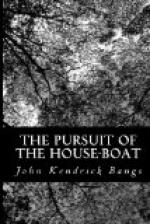“How extraordinary!” cried Elizabeth.
“Yes—and fortunate,” said Cassandra. “Had I not done so, a week hence we should, every one of us, have been lost in the surging wickedness of the city of Paris.”
“But, Cassandra,” said Trilby, who was anxious to return once more to the beautiful city by the Seine, “he told us we were going to Paris.”
[Illustration: “‘HE TOLD US WE WERE GOING TO PARIS’”]
“Of course he did,” said Madame Recamier, “and in so many words. Certainly he was not drawing upon his imagination there.”
“And one might be lost in a very much worse place,” put in Marguerite de Valois, “if, indeed, it were possible to lose us in Paris at all. I fancy that I know enough about Paris to find my way about.”
“Humph!” ejaculated Cassandra. “What a foolish little thing you are! You don’t imagine that the Paris of to-day is the Paris of your time, or even the Paris of that sweet child Trilby’s time, do you? If you do you are very much mistaken. I almost wish I had not warned you of your danger and had let you go, just to see those eyes of yours open with amazement at the change. You’d find your Louvre a very different sort of a place from what it used to be, my dear lady. Those pleasing little windows through which your relations were wont in olden times to indulge in target practice at people who didn’t go to their church are now kept closed; the galleries which used to swarm with people, many of whom ought to have been hanged, now swarm with pictures, many of which ought not to have been hung; the romance which clung about its walls is as much a part of the dead past as yourselves, and were you to materialize suddenly therein you would find yourselves jostled and hustled and trodden upon by the curious from other lands, with Argus eyes taking in five hundred pictures a minute, and traversing those halls at a rate of speed at which Mercury himself would stand aghast.”
“But my beloved Tuileries?” cried Marie Antoinette.
“Has been swallowed up by a play-ground for the people, my dear,” said Cassandra, gently. “Paris is no place for us, and it is the intention of these men, in whose hands we are, to take us there and then desert us. Can you imagine anything worse than ourselves, the phantoms of a glorious romantic past, basely deserted in the streets of a wholly strange, superficial, material city of to-day? What do you think, Elizabeth, would be your fate if, faint and famished, you begged for sustenance at an English door to-day, and when asked your name and profession were to reply, ’Elizabeth, Queen of England’?”
“Insane asylum,” said Elizabeth, shortly.
“Precisely. So in Paris with the rest of us,” said Cassandra.
“How do you know all this?” asked Trilby, still unconvinced.




